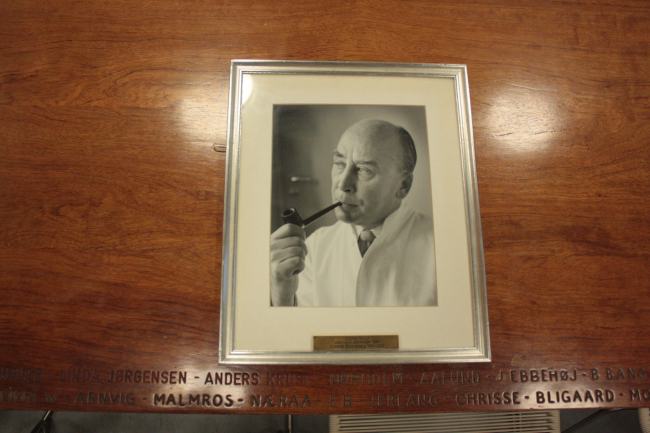In January, I dashed over to the Danish National Hospital (Rigshospitalet) as soon as I heard that its Neuroscience Center had an old table imbued with “Korean spirit.” When I entered a conference room at the hospital, in the middle of it was a large, varnished wooden board table blazing with yellowish-brown lays as if it was ready to unveil over the past 65 years.
Dr. Johannes Jakobsen, director of the center, told me a special story behind the table. After the Korean War broke out in 1950, the Danish government decided to dispatch the hospital ship “Jutlandia” as part of its contribution to the U.N. operations in Korea, as it has done in other parts of Northeast Asia.
Dr. Eduard Busch was one of the most prominent medical personnel on board the Jutalandia. At that time, there were only two neurosurgeons in this Scandinavian country. He was one of them, and a favorite pupil of American doctor Harvey Cushing, who was acknowledged as the highest authority on neurosurgery in the world back then. Busch also founded the Neuroscience Center at the national hospital.
In Korea, the high-flying surgeon fought to save the lives of people suffering from the calamity of war in the face of severe danger, pain and stress weighing heavily upon himself. When he was about to leave the ravaged nation upon the completion of his mission, Korean doctors deeply moved by his benevolence and achievements gave him seven exquisite pieces of Korean hardwood as a token of their appreciation. Busch brought it back home, built a table with them and placed it at his workplace to commemorate his time in Korea.
The table was engraved with 80 names of neurosurgeons who worked at the hospital for more than one year, proudly serving as a “hall of fame” in Danish neurosurgery. With construction being now under way nearby for a new building for the ward, most center staff are concerned whether there would be enough space to place the table.
 |
A portrait of Dr. Eduard Busch is engraved on a table made with Korean hardwood and placed at the Danish National Hospital in Copenhagen. (Korean Embassy in Denmark) |
The Jutlandia is a memorable chapter in the history that Danes are proud of. When the Danish government published advertisements to recruit medical personnel for the Korea mission, they were deluged with applications from across the country. For instance, when they needed to hire 42 nurses, 4,000 nurses applied nationwide. It was also the case for doctors. As a result, they were able to dispatch the best medical team with the most successful treatment rate among all the other multinational medical teams dispatched to Korea at the time.
During the Korean War, around 5,000 U.N. soldiers were treated aboard the Jutlandia, and only 29 of them died. A number of U.N. soldiers were found to have attached a memo to their military identification tags stating, “Please let me be treated on the Jutlandia if I am injured.” The medical staff on the ship also left a deep impression among Koreans as they also treated thousands of civilians, mostly young children. This was made possible by the state-of-the-art technology of the Jutlandia as well as the humanism of the staff on board.
This year marks the 65th anniversary of the dispatch of the Jutalandia to Korea. On Jan. 23, Jutlandia veterans gathered at the Langelinie port where the vessel embarked on its mission in 1951, and stood in brief silence in tribute to their fellow comrades who passed away before them. Out of the 630 medical personnel or crew members on board, only 16 veterans are still alive. In order to commemorate their sacrifices, the Korean Embassy has established a permanent exhibition named “the Jutlandia Hall” within its halls in Hellerup, Denmark. Among the display is a collection of Jutlandia artifacts donated by the veterans who hoped the exhibits will provide younger generations in Denmark, who do not know much about the Jutlandia, with a chance to reflect upon the past and envision dreams about the future.

By Ma Young-sam
The writer is Korea’s ambassador to Denmark, as well as former ambassador for public diplomacy and to Israel and a representative to the Palestinian Authority. -- Ed.









